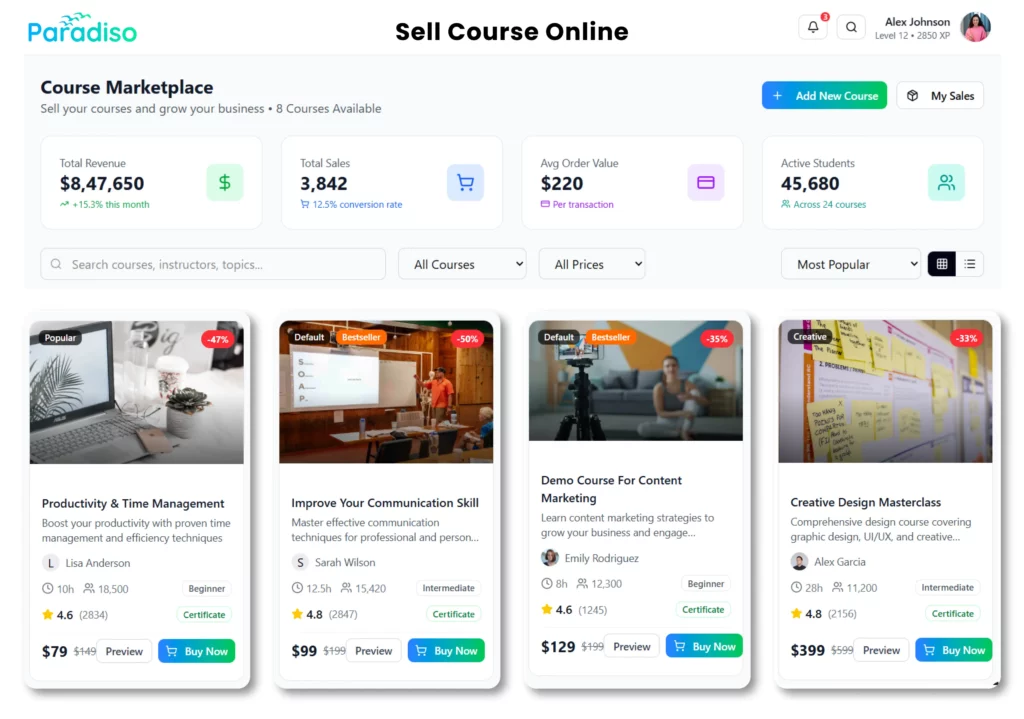In the rapidly evolving world of education, lifelong learning has become essential for personal and professional growth. To cater to the needs of today’s learners, educational institutions and organizations are increasingly turning to Learning Management Systems (LMS) for their continuing education programs. These digital platforms provide a convenient and efficient way to deliver educational content, engage learners, and track their progress. To ensure the success of your continuing education initiatives, choosing an LMS that offers essential features is crucial.
Explore the 15 must-have LMS features for continuing education
User-Friendly Interface:
An intuitive and user-friendly interface is vital for learners of all levels of technical expertise. The LMS should be easy to navigate and visually appealing, providing a seamless learning experience.
Content Management System (CMS):
A robust CMS allows administrators to upload, organize, and update learning materials, including documents, presentations, videos, and assessments. It should support multiple file formats and enable easy content versioning.
Mobile Compatibility:
Mobile compatibility is crucial with the increasing use of smartphones and tablets. Learners should be able to access course materials and complete activities on various devices, ensuring flexibility and convenience.
Customizable Learning Paths:
Continuing education often requires personalized learning paths to meet individual learners’ unique needs and goals. The LMS should allow administrators to create customized learning journeys and provide recommendations based on learner preferences and performance.
Gamification Elements:
Gamification enhances learner engagement and motivation. Look for an LMS that offers gamified features like badges, leaderboards, points, and progress tracking to make the learning experience enjoyable and rewarding.
Assessment and Certification:
A robust assessment system is essential to evaluate learner progress. The LMS should support various assessment formats, such as quizzes, assignments, and exams. Additionally, it should allow for creating and distributing digital certificates upon successful completion of courses or programs.
Collaborative Learning Tools:
Continuing education often involves group projects and collaborative learning activities. Look for an LMS that provides tools for discussion forums, chat rooms, virtual classrooms, and shared document collaboration to facilitate effective online collaboration among learners.
Progress Tracking and Reporting:
Detailed analytics and reporting features help administrators monitor learner progress, identify improvement areas, and assess course effectiveness. The LMS should provide comprehensive tracking and reporting capabilities, including course completion rates, assessment scores, and learner engagement metrics.
Personalized Notifications:
An LMS that offers personalized notifications can help keep learners engaged and informed. It should have automated notification features, such as reminders for upcoming deadlines, new course announcements, and personalized feedback.
Integration Capabilities:
To streamline administrative tasks and enhance the learning experience, an LMS should seamlessly integrate with other tools and systems. Look for features like Single Sign-On (SSO), integration with existing Learning Record Stores (LRS), and compatibility with popular third-party applications.
Social Learning Features:
Social learning plays a vital role in continuing education. The LMS should support social interactions, such as learner profiles, discussion boards, social sharing of achievements, and peer feedback, fostering a sense of community among learners.
Accessibility and Multilingual Support:
To ensure inclusivity, the LMS should comply with accessibility standards (e.g., WCAG) and provide features like screen reader compatibility, keyboard navigation, and closed captioning. Multilingual support is also crucial for reaching a diverse learner base.
E-commerce and Payment Integration:
If your continuing education programs involve paid courses or certifications, choose an LMS that offers e-commerce capabilities and integrates with popular payment gateways. This feature simplifies the enrollment and payment process for learners.
Automated Course Enrollment and Management:
Streamline administrative tasks with an LMS that supports automated course enrollment and management. Learners should be able to self-enrol in courses, while administrators can easily track enrollments, manage waitlists, and assign instructors.
Data Security and Privacy:
Protecting learner data is of paramount importance. Ensure that the LMS complies with relevant data protection regulations (e.g., GDPR) and provides robust security measures, such as encryption, secure user authentication, and regular backups.
Choosing Paradiso LMS for continuing education
When selecting an LMS for continuing education, considering these 15 must-have features can significantly enhance the effectiveness and success of your programs. One platform stands out: Paradiso LMS.
Paradiso LMS also excels in integration capabilities, offering seamless integration with other tools and systems. Whether Single Sign-On (SSO) or compatibility with existing Learning Record Stores (LRS), Paradiso LMS streamlines administrative tasks and enhances the learning experience.
Paradiso LMS encompasses all the must-have features for continuing education. Its commitment to providing a user-friendly interface, robust content management system, mobile compatibility, customizable learning paths, gamification elements, assessment and certification capabilities, collaborative learning tools, progress tracking and reporting features, integration capabilities, accessibility and multilingual support, and robust data security and privacy measures make it the ideal choice for institutions and organizations looking to deliver exceptional continuing education programs.













